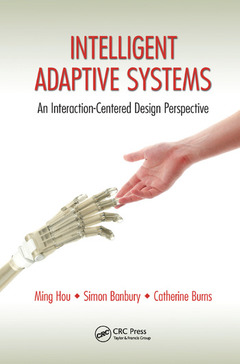Intelligent Adaptive Systems An Interaction-Centered Design Perspective
Auteurs : Hou Ming, Banbury Simon, Burns Catherine

As ubiquitous as the atmosphere, intelligent adaptive systems (IASs) surround us in our daily lives. When designed well, these systems sense users and their environments so that they can provide support in a manner that is not only responsive to the evolving situation, but unnoticed by the user. A synthesis of recent research and developments on IASs from the human factors (HF) and human?computer interaction (HCI) domains, Intelligent Adaptive Systems: An Interaction-Centered Design Perspective provides integrated design guidance and recommendations for researchers and system developers.
The book explores a recognized lack of integration between the HF and HCI research communities, which has led to inconsistencies between the research approaches adopted, and a lack of exploitation of research from one field by the other. The authors integrate theories and methodologies from these domains to provide design recommendations for human?machine developers. They then establish design guidance through the review of conceptual frameworks, analytical methodologies, and design processes for intelligent adaptive systems. The book draws on case studies from the military, medical, and distance learning domains to illustrate intelligent system design to examine lessons learned.
Outlining an interaction-centered perspective for designing an IAS, the book details methodologies for understanding human work in complex environments and offers understanding about why and how optimizing human?machine interaction should be central to the design of IASs. The authors present an analytical and design methodology as well as an implementation strategy that helps you choose the proper design framework for your needs.
Introduction. Theoretical Approaches. Introduction to Intelligent Adaptive Systems. Conceptual Frameworks for Intelligent Adaptive Systems. Analysis and Design of Intelligent Adaptive Systems. Analytical Techniques. Agent-based Design Principles. User Monitoring Approaches. Guidance for the Design of Intelligent Adaptive Systems. Practical Applications. Case Studies. Conclusions. Appendix 8 - Courses that may use this as a textbook.
Dr. Ming Hou is a senior defence scientist at Defence Research and Development Canada (DRDC) Toronto, where he is responsible for providing science-based advice to the Canadian Armed Forces about the investment in and application of advanced technologies for human-machine systems requirements. His research interests include applied cognition, intelligent adaptive interface and systems design, human-technology/automation interaction, intelligent tutoring, and stereoscopic virtual and mixed reality displays. Dr. Hou is the Canadian National Leader of the Human Systems Performance Technical Panel for the Air in The Technical Cooperation Program (TTCP). He also serves several NATO working groups. Dr. Hou is a senior member of the Institute of Electrical and Electronics Engineers (IEEE), a member of the Human Factors and Ergonomics Society, and a member of the Association of Computing Machinery.
Dr. Simon Banbury is the owner and president of Looking Glass HF Inc., an independent Canadian-based human factors consultancy specializing in optimizing how people interact with technology. He is also a Professeur Associé of the School of Psychology at Université Laval (Canada) where he supervises PhD students and supports teamwork and medical decision making research. Dr. Banbury has almost twenty years of human factors consultancy and applied research experience in defence, industrial, and academic domains; he has worked as a human factors consultant in the defence and industrial sectors, as a lecturer of psychology at Cardiff University, and as a defence scientist for the United Kingdom’s Defence Evaluation and Research Agency (DERA).
Dr. Catherine Burns is a systems design engineering professor and the founding director of the Centre for Bioengineering and Biotechnology at the University of Waterloo (Canada). At Waterloo she also directs the Advanced Interface Design Lab. Her research examines user interface design, visualization, and cognitive work analysis
Date de parution : 10-2017
15.6x23.4 cm
Date de parution : 11-2014
Ouvrage de 344 p.
15.6x23.4 cm
Thèmes d’Intelligent Adaptive Systems :
Mots-clés :
IAS; Human Machine Interaction; Adaptive Automation; HMS Design; Operator State Monitoring; EID; Complex IASs; Te Ch; Goal Directed Task Analysis; SA Requirement; Team CTA; Software Agents; Work Domain Analysis; Monitoring Approaches; Human Automation Interaction; UAV Control; Psychophysiological Measurements; UAV Operator; UAV Pilot; Automation Taxonomy; Work Domain Model; Critical Decision Method; Intelligent Interface; Adaptation Taxonomy; Adaptation Engine



